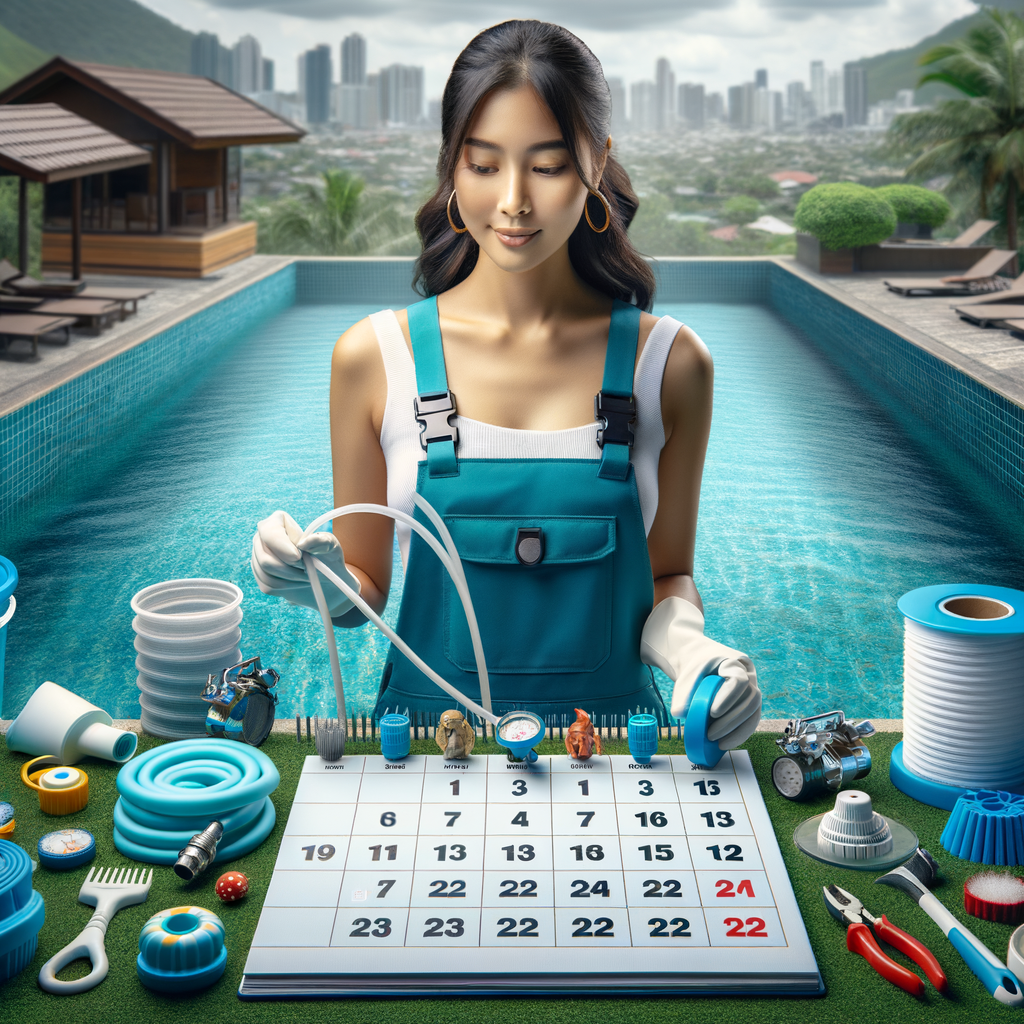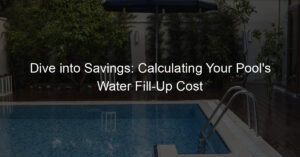
Introduction to Outdoor Pool Maintenance
Having an outdoor pool is a great way to enjoy the warm weather, but it also comes with responsibilities. One of these is pool maintenance. This introductory guide will help you understand the importance of regular pool maintenance and the concept of pool water longevity.
-
- Importance of Regular Pool Maintenance
Regular pool maintenance is crucial for several reasons. Firstly, it ensures that your pool stays clean and safe for swimming. Without regular cleaning and treatment, pools can become a breeding ground for bacteria and algae, which can lead to health issues. Secondly, regular maintenance helps to extend the lifespan of your pool. By checking and fixing any minor issues promptly, you can prevent them from turning into major, costly repairs. Lastly, a well-maintained pool enhances the overall look and value of your property.
-
- Understanding Pool Water Longevity
Pool water longevity refers to how long the water in your pool remains safe and clean for swimming. This depends on several factors, including the quality of your pool’s filtration system, the chemicals used to treat the water, and how often the pool is used. On average, pool water needs to be replaced every 5 to 7 years. However, with proper maintenance and care, you can extend this period and save on water and chemical costs.
In the following sections, we will delve deeper into the topics of keeping pool water clean, addressing outdoor pool water issues, and when and how to replace pool water. By the end of this guide, you should have a good understanding of how to maintain your outdoor pool for longevity.
Understanding Pool Water Longevity
When it comes to maintaining your outdoor pool, understanding the longevity of pool water is key. This refers to how long your pool water can remain healthy and safe for use before it needs to be replaced. Let’s delve into the factors that affect this longevity.
Factors Affecting Longevity of Pool Water
There are several factors that can influence the lifespan of your pool water. Here are the top three:
- Chemical Balance: The balance of chemicals in your pool water plays a crucial role in its longevity. Properly balanced water should have a pH level between 7.2 and 7.8. This balance helps to prevent the growth of bacteria and algae, keeping your pool water clean and safe for longer periods.
- Pool Usage: The frequency and manner of pool usage also affects water longevity. For instance, if your pool is frequently used by a large number of people, the water may need to be replaced more often. This is because oils, lotions, and other substances from swimmers can accumulate in the water over time, affecting its quality.
- Weather Conditions: Weather conditions can also impact the longevity of your pool water. For example, heavy rain can dilute the chemicals in your pool, making them less effective. On the other hand, hot and sunny weather can lead to faster evaporation, which can concentrate the chemicals and make the water too harsh.
By understanding these factors, you can take steps to maximize the lifespan of your pool water. This not only helps to maintain the quality of your pool but also saves you time and money in the long run.
Signs That Your Pool Water Needs Replacement
Keeping your pool in top condition requires regular maintenance and a keen eye for any changes. One of the most crucial aspects of pool care is monitoring the quality of your pool water. Here are some signs that your pool water may need to be replaced:
-
- Cloudy or Discolored Water
Clear water is a sign of a healthy pool. If your pool water becomes cloudy or discolored, it could indicate a problem with your pool’s filtration system or chemical balance. This could be due to high calcium hardness levels, high alkalinity, or a high concentration of dissolved solids. It’s important to test your pool water regularly to ensure it’s clean and safe for swimming.
-
- Algae Growth
Algae growth in your pool is a clear sign that your pool water needs to be replaced. Algae can make your pool water green, slimy, and uninviting. It can also clog your pool’s filter and damage its surfaces. Algae growth is often a result of improper chemical balance or lack of proper pool maintenance. Regularly brushing and vacuuming your pool can help prevent algae growth.
-
- Unusual Smell
A healthy pool should not have a strong chemical or musty smell. If your pool has an unusual smell, it could indicate a problem with your pool’s chemical balance or the presence of bacteria or algae. A strong chlorine smell could mean that there is not enough free chlorine in the pool, which is necessary to kill bacteria and other harmful substances. If you notice an unusual smell, it’s best to test your pool water and adjust the chemicals as needed.
Recognizing these signs early can help you address any issues promptly and keep your pool in good condition. Remember, regular maintenance is key to extending the longevity of your pool water and ensuring a safe and enjoyable swimming experience.
Keeping Pool Water Clean
Keeping your pool water clean is not just about maintaining its sparkling blue appearance. It’s also about ensuring the health and safety of those who use it. Let’s dive into the regular cleaning routine that can help you achieve this.
Regular Cleaning Routine
A regular cleaning routine is essential for maintaining the cleanliness and clarity of your pool water. This routine generally involves three main steps: skimming and brushing, vacuuming, and filter cleaning.
- Skimming and Brushing: Skimming involves removing debris from the surface of the pool water using a net. This should be done daily to prevent the debris from sinking and becoming harder to remove. Brushing the walls and floor of the pool helps to dislodge algae and other buildup that can cloud your water and potentially cause damage.
- Vacuuming: Vacuuming your pool is a more thorough way to remove debris that has sunk to the bottom. It’s recommended to vacuum your pool at least once a week. This not only keeps your pool looking clean, but also helps to prevent the growth of algae and bacteria.
- Filter Cleaning: Your pool’s filter plays a crucial role in keeping your water clean. It traps and removes smaller particles that skimming and vacuuming can’t catch. Cleaning your filter regularly ensures it continues to function effectively. Most experts recommend cleaning your pool filter every 4-6 weeks, or whenever the pressure gauge reads 8-10 pounds above the starting pressure.
By incorporating these steps into your regular pool maintenance routine, you can keep your pool water clean and safe for everyone to enjoy. Remember, a clean pool is a happy pool!
Chemical Treatment
Keeping your pool water clean involves more than just physical cleaning. It also includes the correct use of chemicals. Let’s explore this in more detail.
-
Understanding pH Levels
The pH level of your pool water is a crucial factor in maintaining its cleanliness. The pH scale ranges from 0 to 14, with 7 being neutral. Pool water should ideally have a pH level between 7.2 and 7.8. This range is safe for swimmers and helps chlorine work effectively.
If the pH level is too high, the water can become cloudy, and the chlorine becomes less effective. On the other hand, if the pH level is too low, it can cause eye irritation and corrosion of pool equipment.
Regularly testing and adjusting the pH level of your pool water is essential for maintaining a clean and safe pool.
-
Chlorine Treatment
Chlorine is a popular chemical used in pool water treatment. It acts as a disinfectant, killing bacteria and other harmful microorganisms in the water.
Chlorine levels in pool water should ideally be between 1 and 3 parts per million (ppm). If the chlorine level is too low, it may not effectively kill bacteria and algae. If it’s too high, it can cause skin and eye irritation.
Chlorine comes in different forms, such as tablets, liquid, and granules. Regardless of the form you choose, it’s crucial to add the right amount to your pool water and test the chlorine level regularly.
-
Algaecides and Other Treatments
Algae can be a common problem in outdoor pools. Algaecides are chemicals specifically designed to kill algae and prevent their growth.
Other treatments include shock treatments, which are used to quickly raise the chlorine level in the pool to kill bacteria and algae. There are also clarifiers that help keep the water clear by clumping small particles together so they can be removed by the filter.
Remember, each pool is unique, and the type and amount of chemicals needed may vary. Always follow the manufacturer’s instructions when using pool chemicals.
Addressing Outdoor Pool Water Issues
Keeping your outdoor pool sparkling clean can be a challenging task. It’s not just about removing leaves and debris. You also need to address various water issues that can affect the health and enjoyment of your pool. Let’s dive into some of the common pool water problems and how to tackle them.
Common Pool Water Problems
Every pool owner will likely encounter these common water issues at some point:
- Algae growth: Algae are tiny plants that can turn your pool water green, yellow, or even black. They can make the pool surfaces slippery and can clog your pool filter. Algae growth is often a sign of poor water balance or inadequate filtration.
- Cloudy water: Cloudy or milky water can be caused by various factors, including high calcium hardness, high alkalinity, poor filtration, or the presence of contaminants. It can make your pool look uninviting and can also indicate potential health risks.
- Stains and discoloration: Stains on your pool surfaces can be caused by metals (like iron or copper) in the water, organic material (like leaves or algae), or poor water balance. They can be unsightly and can damage your pool surfaces if left untreated.
Understanding these common pool water problems is the first step towards maintaining a clean and healthy pool. In the next section, we will discuss some effective solutions to these issues. Remember, prevention is always better than cure. Regular testing and adjustment of your pool water can help prevent these problems from occurring in the first place.
Solutions for Pool Water Problems
Keeping your pool water clean and clear is not always easy. But don’t worry, we have some solutions for you. Let’s explore them.
-
- Chemical Treatments
Chemical treatments are a common way to solve pool water problems. They help to balance the water’s pH level, which is important for keeping the water clear and safe. For example, chlorine is a popular chemical used in pools. It kills bacteria and other harmful organisms. But remember, always follow the instructions on the chemical package. Too much or too little can cause problems.
-
- Pool Shock
Have you heard of pool shock? It’s a super-chlorinating treatment that helps to kill bacteria and algae. It’s like a deep clean for your pool. Pool shock is usually needed when the pool water is cloudy or has a strong chlorine smell. It’s a good idea to shock your pool once a week during the swimming season. But be careful, always wear gloves and goggles when handling pool shock.
-
- Pool Draining and Refilling
Sometimes, the best solution is to start fresh. Draining and refilling your pool can solve many water problems. It’s like giving your pool a new start. But remember, this should be your last resort. Draining a pool can be risky because it can damage the pool’s structure. Always consult with a pool professional before draining your pool.
In conclusion, maintaining clear and clean pool water requires regular care and attention. But with these solutions, you can tackle any pool water problem that comes your way. Happy swimming!
Pool Water Replacement: When and How?
Keeping your pool clean and safe is a top priority for any pool owner. One of the key aspects of pool maintenance is knowing when and how to replace your pool water. Let’s dive into this topic.
When to Change Pool Water
There are two main factors to consider when deciding when to change your pool water: the signs that your pool water needs replacement and the recommended frequency for pool water change.
-
- Signs that your pool water needs replacement
There are several signs that your pool water needs replacement. If your water has a strong chlorine smell, it may indicate a high level of chloramines, which can cause skin and eye irritation. Another sign is cloudy or discolored water, which could be due to algae growth or a high level of contaminants. If you’re constantly battling with algae or your pool chemicals are not effectively balancing the water, it might be time for a water change.
-
- Recommended frequency for pool water change
The frequency of pool water change can vary depending on the usage of the pool, the chemical balance, and the quality of the water source. However, as a general rule, it is recommended to change your pool water every 5 to 7 years. Regular testing of your pool water can help you determine if a water change is needed sooner.
Remember, maintaining the quality of your pool water is not only about changing it when needed. Regular cleaning, proper chemical balance, and routine maintenance are all crucial for a healthy and enjoyable pool.
How to Change Pool Water
Changing your pool water might seem like a daunting task, but it’s actually quite simple if you follow these steps. The process involves three main stages: draining the pool, cleaning it, and then refilling it.
-
- Draining the Pool
First, you need to drain the pool. This can be done using a submersible pump, which you can rent from a home improvement store. Place the pump at the bottom of the pool and connect it to a garden hose. Make sure the other end of the hose is in a suitable place for the water to drain, like a storm drain. Turn on the pump and let it run until all the water is removed. Remember, it’s important to monitor this process to prevent any problems.
-
- Cleaning the Pool
Once the pool is empty, it’s time to clean it. Start by scrubbing the sides and bottom of the pool with a long-handled pool brush. This will help remove any algae or other buildup. Then, use a pool vacuum to remove any remaining debris. If there are any stubborn stains, you can use a pool stain remover. Make sure to follow the instructions on the label.
-
- Refilling the Pool
After cleaning, you can start refilling the pool. Use a garden hose and let the water flow in. It’s a good idea to add a water conditioner as the pool fills to help balance the chemicals. Once the pool is filled, test the water to ensure it has the correct pH and chlorine levels. You can use a pool test kit for this. If the levels are off, you can add the necessary chemicals to balance them.
Changing your pool water is a necessary part of pool maintenance. By following these steps, you can ensure your pool stays clean and safe for everyone to enjoy.
| Step | Task | Tools Needed |
|---|---|---|
| 1 | Drain the pool | Submersible pump, garden hose |
| 2 | Clean the pool | Pool brush, pool vacuum, pool stain remover |
| 3 | Refill the pool | Garden hose, water conditioner, pool test kit |
Remember, maintaining the quality of your pool water is crucial for the longevity of your pool and the health of those who use it. Regularly changing your pool water can help prevent issues such as algae growth and waterborne illnesses.
Maintaining Outdoor Pool Water for Longevity
Keeping your outdoor pool in top-notch condition is not just about aesthetics; it’s also about ensuring the longevity of your pool water. Here are some regular maintenance tips that can help you achieve this.
Regular Maintenance Tips
Regular maintenance is the key to keeping your pool water clean, clear, and safe for swimming. Let’s dive into some of the most important aspects of pool maintenance.
- Keeping the pool clean:Cleaning your pool regularly is crucial. This includes skimming off leaves and debris, brushing the sides and bottom of the pool, and vacuuming. A clean pool not only looks good but also prevents the growth of algae and bacteria, which can affect the quality of your pool water.
- Regular chemical treatment:Chemical treatment is another essential aspect of pool maintenance. The right balance of chemicals keeps the water safe and prolongs its lifespan. This includes maintaining the proper pH, alkalinity, and chlorine levels. Remember, overuse of chemicals can be harmful, so it’s important to use them judiciously.
- Addressing pool water issues promptly:If you notice any issues with your pool water, such as cloudiness, green color, or a strong chlorine smell, it’s important to address them promptly. Ignoring these issues can lead to bigger problems in the future and can shorten the lifespan of your pool water.
In conclusion, maintaining the longevity of your pool water requires regular cleaning, chemical treatment, and prompt attention to any issues. By following these tips, you can enjoy a clean, clear, and safe pool for many years to come.
Professional Pool Maintenance
Keeping your pool in top shape is not always an easy task. It requires time, effort, and a good understanding of pool chemistry. This is where professional pool maintenance comes into play. Let’s delve into the benefits of professional pool maintenance and how to choose the right service for your needs.
-
- Benefits of Professional Pool Maintenance
Professional pool maintenance offers several advantages. Here are a few key benefits:
-
-
- Expertise: Professionals have the knowledge and experience to handle all types of pool issues. They understand the right balance of chemicals needed to keep your pool clean and safe.
- Time-saving: Regular pool maintenance can be time-consuming. Hiring professionals can free up your time, allowing you to enjoy your pool rather than spending hours maintaining it.
- Cost-effective: While there’s a cost involved in hiring professionals, it can save you money in the long run. Professionals can spot and fix minor issues before they become major, expensive problems.
- Regular maintenance: Professional services provide regular maintenance, ensuring your pool remains in optimal condition all year round.
- Choosing a Pool Maintenance Service
-
When it comes to selecting a pool maintenance service, there are several factors to consider:
-
- Experience and Qualifications: Look for a company with a proven track record and certified professionals.
- Services Offered: Ensure the company provides all the services you need, from regular cleaning to chemical balancing and repairs.
- Customer Reviews: Check out customer reviews and ratings to get a sense of the company’s reputation.
- Cost: Compare prices from different companies to ensure you’re getting a fair deal. Remember, the cheapest option isn’t always the best.
In conclusion, professional pool maintenance can save you time, money, and ensure your pool remains in top condition. Choosing the right service requires careful consideration of their experience, services offered, customer reviews, and cost.
Conclusion: Maximizing Your Pool’s Lifespan
As we conclude, it’s crucial to remember that the longevity of your pool is directly tied to the quality of care it receives. By understanding and implementing the right maintenance practices, you can ensure your pool serves you for many years to come.
-
- Importance of Pool Water Care
Proper pool water care is the cornerstone of a long-lasting pool. It’s not just about keeping the water sparkling clean, but also about maintaining the right chemical balance. This prevents the growth of harmful bacteria and algae, which can cause significant damage to your pool’s structure and systems. Regular testing and adjustment of your pool water’s pH and chlorine levels are essential to maintaining its health and longevity.
-
- Key Takeaways for Maintaining Pool Water Lifespan
Here are some key points to remember:
-
- Regular testing and adjustment of pool water chemistry is vital.
- Proper cleaning and filtration systems are crucial to keep the water clear and free of debris.
- Addressing pool water issues promptly can prevent further damage and extend the pool’s lifespan.
- Replacing pool water should be done as a last resort, and only when necessary.
In conclusion, the lifespan of your pool is largely in your hands. With regular care and attention, you can enjoy your outdoor pool for many years to come. Remember, a well-maintained pool is not just a source of fun and relaxation, but also a valuable asset to your home.













